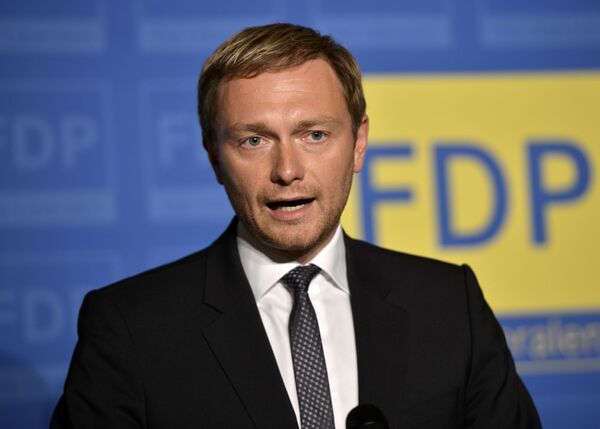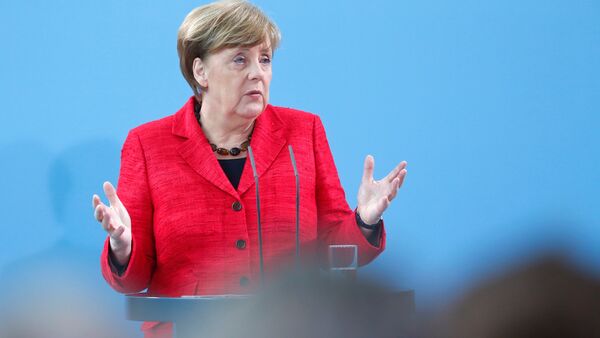Negotiations on the forging of a "Jamaica" coalition in Germany — a three-way alliance between the CDU/CSU, Free Democrats and Greens — recommenced November 6. Despite the confident public tone struck by Angela Merkel and her CSU counterpart Horst Seehofer, significant hurdles remain.
While it's not unusual for coalition talks in Germany to endure for many weeks — in 2013, it took over two months for the CDU/CSU and Social Democrats to agree a grand coalition, and in 2009, Merkel and the FDP took a month to reach a deal — discussions between the triumvirate have been intense.
Ever since exploratory talks began October 18, the trio have struggled to even agree on the precise problems that need to be addressed before an agreement is inked, and the weekend of November 4-5 saw FDP leader Christian Lindner raise the possibility talks could fail outright.
Social Democrat leader Martin Schulz responded to the suggestion by stating if that came to pass, a new election would need to be held.
On #JamaikaKoalition, #FDP Chairman @c_lindner says chances are "50-50." pic.twitter.com/7tU1xZrfN6
— Jefferson Chase (@chaseongermany) November 6, 2017
Lindner restated that position just before discussions kickstarted again, saying while he didn't want a new election, the FDP "were not afraid of voters" — although he indicated chances of a government being formed within the next fortnight were 50-50.
The Greens however, have made clear they don't wish to see a re-run vote, and are committed to forming a new government with Merkel at the helm, dropping key demands on tax reforms and climate policy in order to facilitate more fruitful negotiations. In particular, the party will no longer consider the imposition of fixed dates to shut down coal-fired power stations and the banning of cars with internal combustion engines deal-breakers.
Angela Merkel convinces German Greens to drop environmental policies as price of coalition pic.twitter.com/mILxNmAqfM
— Srbija Evropa (@srbija_eu) November 7, 2017
The CDU has responded positively to such efforts, and made clear they are willing to return the favor.
European Alienation
The parties remain strongly divided in key areas. The intertwined issues of European integration and immigration split the trio in separate directions.
For instance, the CDU/CSU, wary of voters alienated by its immigration policy, seek to cap the number of refugees accepted into the country annually at 200,000, which has been rejected by the Greens.

The FDP broadly supports the cap, but is in favor of a very strict immigration act that allows for the immediate deportation of illegal immigrants — a prospect again hotly contested by the Greens.
Conversely, the FDP has a mild but firm euroskepticism at its core, and stood on a platform of the ending of the European Stability Mechanism (ESM) and a withdrawal option for eurozone members, and a slowing of EU integration.
Nonetheless, Lindner has indicated he likes some of French President Emmanuel Macron's reform proposals, and his opposition to a eurozone budget is shared by his prospective partners.

However, Green environmental stances are singularly not shared by other parties, and necessitate significant concessions from their two partners.
Despite their compromising on coal and cars, their revised demands may be too much for Merkel to swallow, especially given the CDU governs several German states heavily dependent on coal, both in terms of their energy and local economy needs. In any event, these compromises must be ratified by the party's November 25 annual conference before they can become concrete policy.
Moreover, eastern states are likely to be highly averse to the closure or even partial cessation of the industry — particularly as the FDP has made the dismantling of the "Solidarity Supplement" for these regions by 2021 a central demand.
The Supplement, which pumps money into impoverished areas formerly comprising the German Democratic Republic, has been a major sticking plaster for states still reeling from the shock of reunification, in which industry has shrivelled and unemployment is relatively high. Its loss, combined with a scaling back of the coal industry, would be potentially ruinous.
FDP Intransigence
The FDP are likely to drive a hard bargain on this and other issues, and have understandable historical reasons for doing so.
In 2013, the party failed to clear the five percent threshold to secure Bundestag representation after four years as the CDU/CSU's junior coalition partners, a failure attributed by many in the party to its spell in government with Merkel.
In essence, leaders are keen to demonstrate the party remains an independent voice in government, rather than a lackey.
Moreover, the party may not have much to lose in the event of a new election. Back in parliament after four years, the party performed better than expected on September 24, and has maintained its double-figure standing in polls since.
Conversely, CDU/CSU polling performance has fallen since the election, suggesting the party alliance has more to lose than its potential junior partner — and Merkel needs the FDP perhaps more than they need her.


